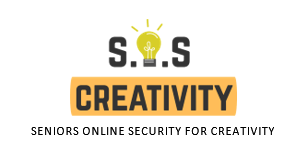In preparation of the Guidelines for future Use…
Since March 2021, the SOS Creativity’ strategic partnership – an international consortium represented by eight organisations from six Member States – is collaborating to develop new training resources and methodologies for the empowerment of seniors’ ICT skills and proficiency. So far, the implementation of the project lead to the following results – concrete deliverables of the project that are available for free consultation via the official Open Education Resource Platform: https://www.soscreativity.eu/index.php
- The set-up of the very website of the project: digital repository of news, material and training resources delivered by partners throughout implementation. The access to the platform does not require any log-in credential, so as to ease as much as possible the usability of the content within, and project’s digital identity among relevant stakeholders and groups of interest. Each upload is translated into all official languages of the Countries represented by participating organisation, in order to facilitate the browsing experience even of non-proficient ENG speakers.
- The SOS Self-Assessment tool: a tailored-made algorithm which calculates the level of IT risks awareness of target group users in the field of online cultural resources available. The IT index will be an instrument that allows adults to assess their awareness in the domain of IT risks related to cultural offers. The SOS Self-Assessment Tool will not be a statistical index, but an operational tool to support the development of targeted-training solutions for adults.
- The SOS Cultural Resources Mapping: an international assessment of free cultural resources and creativity tools already available online in each partners’ countries aiming at extrapolating and intercepting those digital skills and competences that late digitals might need to make the most of them and have an in-depth analysis of the phenomenology on the degree of digital gap among ICT-low-skilled adults.
- The SOS Training Curricula on basic IT skills for digital tardive: a total of 12 training modules, designed and conceived to trigger’s few essentials learning outcomes as identified per project proposal:
- Essentials of cultural and media literacy
- Personal Data protection and Online Security
- Economic transactions
- Digital Identity
Each of the training module is tailored to provide for easy-to-assess and ready-to-use capacity building material that can help targets in acquiring new knowledge and competences to browse the web safely, effectively and efficiently.
| Interacting with digital technologies for entertainment and culture | Basics of digital technologies: what you should know about internet | Social media communication for culture and creativity |
| Cultural opportunities online | It is never too late to… Spend money on culture, comfortably seated on the armchair | Digital identity and online reputation |
| How to identify missing information and fake news online in a culture relevant context | Threats and challenges on social media: dos and donts | What is gdpr? |
| Developing digital content. Integrating and reworking digital content. | Online security and creativity: what’s up? | Platforms promoting culture and how they work |
Each of these modules has been delivered in piloting version and the overall curricula reached a cohort of 180 people, representative both of final users and STKHs in general (i.e., professionals operating in the domain of Adult Education).
Results emerging from the validation cycle (i.e., impression of learners and participants) have been collected by all partners after conclusion of the training sessions and shared with the whole consortium for assessment and stock taking of lessons learnt.
These inputs will flow into the SOS Guidelines for Future Use: this document will guarantee transferability as they will be a tool to guide Adult Education teachers and operators who intend to engage in a process of raising awareness and training late digitals on a more conscious use of cultural and creative resources in general and on Internet and social media risks and opportunities as a side effect.
The guidelines will refer to both practical and organizational aspects as well as issues of educational-pedagogical approach and content. These will be of great use to encourage the introduction of SOS Creativity training courses in elderly centres or organizations.


